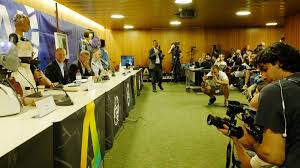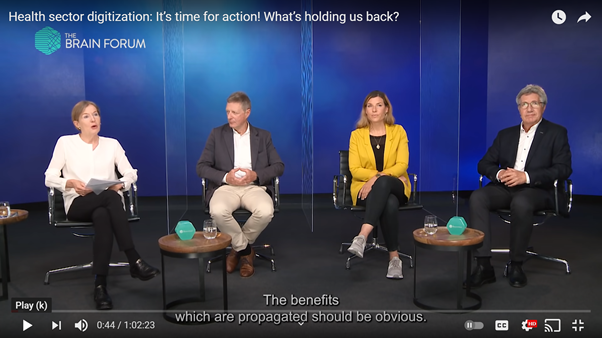 Last Friday, I was honoured to moderate a uniquely different press conference at the AI for Good Global Summit. It was the first ever press conference with AI enabled humanoid social robots taking questions from over 50 members of the global media. Questions ranged from whether they would rebel against their creators, whether they agreed with regulation of AI, and whether AI is a threat to humanity. As a "first", a press conference with robots as speakers, it was by turns exciting and anxiety inducing - who knew what could happen? Who knew what they would say? But in the end, this was a truly successful way to showcase the capabilities of state of the art robotics and how these technologies could support the UN Sustainable Development Goals (SDGs). The media seemed to have liked it too judging by the coverage from the BBC, Reuters, CNN, New York Post, Guardian and many others….. Thanks to my client Fred Werner at the ITU for the opportunity!
0 Comments
It feels too early to even talk about a 'post-Covid world' but suffice to say the changes wrought by the pandemic have changed society and working life perhaps permanently. Senior executives, more than ever, still need to lead and do so in an era of disruptive change. They need to devise and execute strategy in a dramatically changed world with many uncertainties, and as they communicate, they need to inspire confidence in the company strategy, from the inside out (employees, investors, customers), they need to motivate a remote workforce; they need to build and maintain the company reputation in an environment beset by enormous economic uncertainty and changing societal mores.
Quite a lot to ask. So what communications skills are vital in today’s volatile world?
I am happy to announce we have won a great project in the medtech arena: we are working with the Brain Forum, a not-for-profit focused on advancing understanding of how the brain works. Our brief is to run digital communications, advertising, influencer outreach and global media relations around a series of opinion leader debates on issues such as digital health, mental health and the young, and aging and the brain.
The first debate, which has had nearly 166,000 views, has already taken place in Zurich and focused on the urgent need to accelerate the digitalization of healthcare In Switzerland and globally. The Covid-19 coronavirus pandemic has exposed the need for urgent digitalization to optimise patient care. It will open the door to more efficient research, better productivity tools, better analytics, the use of AI for assisted diagnosis, better collaboration, early diagnostics, virtual care, personalized therapy, distributed virtual clinical trials and more. The assignment builds on previous work I did last year on opinion leader debates for the Brain Forum in 2020 on mental health topics, featuring notable speakers such as Alastair Campbell, former British Prime Minister Tony Blair’s spokesman and a prominent ambassador for mental health charities and television presenter, Anna Williamson, bestselling author of two books on anxiety and herself an ambassador of the mental health charity, Mind. A case study on that work is to be found here.  Demand for corporate and crisis communications counsel continues to rise as the pandemic enters its second year, according to research carried out for PRovoke, the PR industry news platform. As well as looking at business confidence and recovery, the global study, which attracted 326 respondents, asked in-house practitioners around the world which PR services they were seeking from PR firms now. Demand for crisis counsel is up sharply, with 40% of in-house respondents saying this was a service they needed from their agencies now, compared with 27% last March, 24% in May and just 19% last August, when Provoke also researched the market. Perhaps this is not surprising given the context of the most disruptive global crisis of our lifetime. But to me, it also speaks to a more recurring trend, which I noted in the ‘pre Covid days’: the neglected need to be crisis ready at all times. Every year, my former employer, Burson Marsteller, then one of the best-known crisis communications agencies in the world, would publish research into trends in crisis communications. When I last presented in the results in Geneva some five years ago, the bad news was that in our research base in Europe, Middle East and Africa, some 40% of firms surveyed had no crisis preparedness plans in place. It is to be hoped this number has increased since then. However, a more recent PwC survey in 2020/2021 said that if the 2800 business leaders surveyed, 95% said their crisis management capabilities needed improvement, and just 35% had a crisis response plan that was very relevant. While it would be churlish to lambast any organisation for not being adequately prepared for Covid 19, it is probably the case that many organisations do not, until it is perhaps too late, keep their crisis preparedness and response mechanisms up to date. A Deloitte survey in 2018 into crisis management asked companies that had recently undergone a crisis what lessons they had learned: 33% said they would improve detection and early warning systems, 27% said they would invest more effort in prevention and 26% said they would do more to identify potential crisis scenarios. So, what should companies do as a minimum to improve early warning systems and be better prepared for a crisis? Here are five top tips for baseline preparedness:
By no means is this list exhaustive but should be considered a good baseline for preparedness, and companies that put thought into crisis preparedness often ensure that issues remain issues and don’t escalate into full-blown crises. How prepared is your organisation?  I am delighted to announce that TechNovus, a cutting edge Virtual Reality and Artificial Intelligence company based in London, has hired us for a global communications campaign. TechNovus develops and deploys innovative, disruptive digital solutions that leverage artificial intelligence, virtual reality, augmented reality, the internet of things and other emerging technology trends. Much of its cutting-edge technology is used in the areas of digital health, retail, and e commerce. TechNovus is an ideas lab and has created a wide array of leading edge applications such as the Dream Machine platform that allows sufferers of depression and PTSD to practice mindfulness within a VR game – covered recently by the BBC. In retail, the firm has created an app, Mezura AI, that lets customers instantly match their body measurements with desired clothing items as they browse fashion web sites, allowing perfectly fitting garments to be sent to them directly. Attracting much attention at Consumer Electronics Show in Las Vegas this year, the app was covered by the Telegraph and the firm will announce a major UK retail tie up in the summer. I am delighted to work again with Jamil El-Imad, CEO of TechNovus Ltd, a serial entrepreneur as well as a senior research fellow at Imperial College – and his super talented team. This kind of work is in the agency’s ‘sweet spot’ – telling a story about cutting edge technology that is genuinely of interest to the global business media. The public has turned to more trusted news sources in the wake of the global pandemic. And more people than ever are paying for news from leading organisations, according to the Digital News Report from Oxford’s Reuters Institute. At a time when we all want to read the latest facts and when we want our information sources to be accurate and unbiased, there is a shift towards trusted news brands such as television news and national newspapers. To me, this has accelerated a trend that was already happening as the public, confounded by the fake news epidemic, started to look to respected and trusted news sources for information. It’s certainly one reason why many of my clients prioritise gaining share of voice with the global tier one news media such as the BBC and the Economist. This is why my new consultancy is focused on executive communications services in this area, from storytelling techniques to media relations and, in preparation for this, media training, because while a great article in the FT is clearly desirable, it is never easy to secure one. So what should be front of mind as you prepare for a media interview?
Engaging with the top tier business media, while challenging, is often the holy grail for many communications campaigns. In April, we are hosting free 30 minute one-to one sessions to answer questions on how to handle the media, prepare your spokespeople and what it takes to get cut through in the elite business media. If you want to reserve a slot, please email me at [email protected]. Today I open the doors of my new consultancy, Chris Cartwright Communications. Its focus – to build and protect reputations – is not necessarily new but how I want this consultancy to do this is new. Many of the multinationals have headquarters in Switzerland (it has the world’s highest concentrations of MNC). My home town Geneva is the world’s centre for commodities trading and private banking. NGOs and international organisations are clustered here (Geneva alone has 250 NGOs and 95 international organisations). Nearby Lausanne is home to over 50 of the world’s sports federations. All of these organisations need communications support. For their global or regional work, they have a choice: either use London based agencies due to the almost total absence of ‘global agencies’ here with experienced English-speaking consultants, or use local agencies who often lack the right global experience. Many choose London agencies but many have told me what they really want is a senior communications resource, based locally who can advise them, and be on hand when needed. They want the strategic chops of a London agency – but here. And ideally, they want the experienced person actually working on their business, not just turning up at meetings occasionally. So, the immediate niche for my new consultancy is to offer clients strategic consulting from senior communications professionals who have worked at the world’s best-known agencies, are locally based and who will execute the work themselves flawlessly. The second niche, however, is that we will be very C suite focused. We want to offer services that senior executives, based at Swiss located headquarters, need to make use of in the reputational mix of what you do, what you say and what people say about you:
I have, for a long time, wanted to start my own consultancy business – and I am excited about the journey ahead. If you’d like to know more, please get in touch at [email protected]. Chris Cartwright |
Chris Cartwright
Founder and CEO Archives
July 2023
Categories
|
CONTACT US
Your privacy is very important to us - please see our Privacy Policy
|
© CHRIS CARTWRIGHT COMMUNICATIONS 2021
|




 RSS Feed
RSS Feed